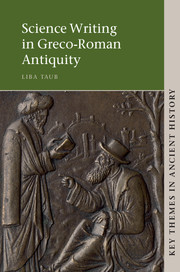
- Cited by 10
-
Cited byCrossref Citations
This Book has been cited by the following publications. This list is generated based on data provided by Crossref.
2018. Books Received. The Classical Review, Vol. 68, Issue. 1, p. 293.
Lawrence-Mathers, Anne 2019. Medieval Meteorology.
Taub, Liba 2020. The Cambridge Companion to Ancient Greek and Roman Science.
Martelli, Matteo 2020. Ancient handbooks and Graeco-Egyptian collections of alchemical recipes. BJHS Themes, Vol. 5, Issue. , p. 39.
2021. Bibliography. Bulletin of the Institute of Classical Studies, Vol. 63, Issue. 2, p. 122.
Jardine, Nicholas 2021. Philosophical engagements with distant sciences. Interdisciplinary Science Reviews, Vol. 46, Issue. 3, p. 225.
Trevizam, Matheus 2022. Tipologias literárias e exposição técnica em Virgílio e Paládio. Phaos: Revista de Estudos Clássicos, Vol. 22, Issue. , p. e022006.
Roby, Courtney Ann 2023. Scientific Visual Representations in History. p. 141.
2024. Spaliere für Silvinus. p. 508.
Birney, Kathleen J. 2024. Rethinking Pliny’s “Sicilian Crocus”: Ecophysiology, Environment, and Classical Texts. Economic Botany,
- Publisher:
- Cambridge University Press
- Online publication date:
- April 2017
- Print publication year:
- 2017
- Online ISBN:
- 9781139030762
- Series:
- Key Themes in Ancient History




